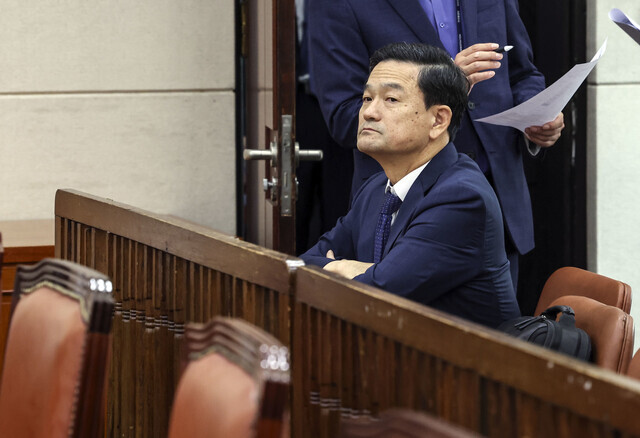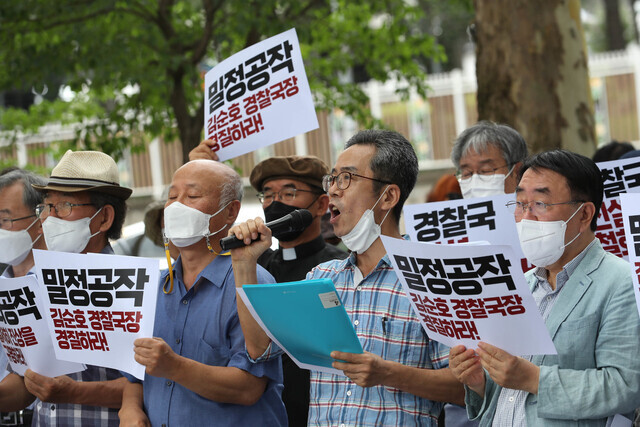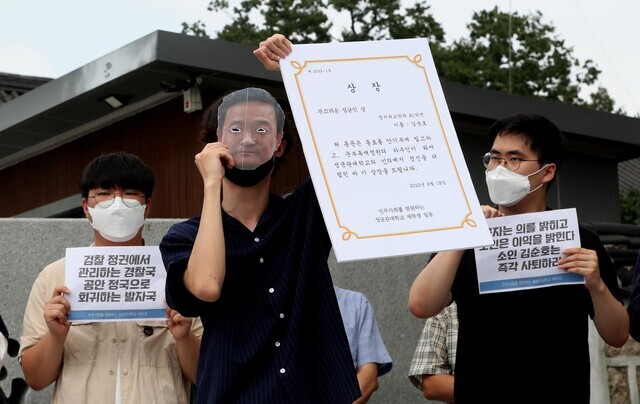hankyoreh
Links to other country sites 다른 나라 사이트 링크
Calls mount for inaugural head of Interior Ministry’s police bureau to resign over past

At 11 am on Thursday a general meeting of the National Assembly’s Public Administration and Security Committee (PASC) was ongoing with Kim Sun-ho, head of the Ministry of the Interior and Safety’s police bureau, in attendance. At the same time across town, current students of Sungkyunkwan University were holding a press conference in front of their school’s front gate. Stating that they would present Kim, a Sungkyunkwan University alumnus, a “shameful alumnus award,” the students urged him to immediately resign as police bureau chief and apologize to victims.
Earlier, at 10 am on the same day, Sungkyunkwan University alumni groups held a press conference in front of the presidential office in the Yongsan District of Seoul, demanding that inquiries be made into the allegation that Kim once worked as an undercover agent for the government.
Although Kim has continuously denied the allegations, there continues to be speculation that Kim was specially hired into the anti-communism unit of the Ministry of Home Affairs’ National Security Headquarters in exchange for providing information concerning members of the Incheon and Bucheon Democratic Workers Association (IBDWA), for which he was an organizer in the late 1980s.
Sungkyungkwan University alumni, as well as Democrats, have been criticizing the fact that Kim, who immediately after cutting ties with the IBDWA joined an anti-communist police squad investigating groups like the IBDWA, has been appointed to lead the newly established police bureau, stating that his appointment “symbolically demonstrates the resurrection of the Ministry of Home Affairs’ National Security Headquarters,” which was shut down 31 years ago.
According to former members of the IBDWA, Kim, who was a key administrator of the workers’ association in the Bucheon area in 1988, disappeared without warning in April 1989. “The White Paper on the Suppression of the IBDWA,” which the workers’ association published at the time, indicates that the National Security Headquarters’ investigation into the group, which began in earnest in January 1989, led to Ahn Jae-hwan (IBDWA chairman), Shin Jeong-gil, and Lee Dong-jin being arrested in February of that year, as well as Choi Dong, a key figure in the IBDWA, being booked by police that April.
After months underground, Kim suddenly resurfaced in August 1989 as a police officer of the third anti-communism investigation unit of what became known as the “Hongje neighborhood anti-communism agency.” Immediately afterward, in September, Choi Dong was arrested. Choi suffered from the aftereffects of torture and subsequently died the following August.

Kim has been fiercely denying the allegation that he provided information regarding the IBDWA to the police. He said, “I only quit [the IBDWA] because of skepticism concerning the Juche faction’s movement, and I never made statements that would have led to my IBDWA comrades being arrested or influenced investigations.”
However, those who were members of the IBDWA with Kim suspect that he worked as an undercover agent for the government, saying that “the police at the time knew information only insiders could have known.”
A former police officer and one of the first class of graduates of the Korean National Police University told the Hankyoreh on the condition of anonymity, “I heard from people who were in charge of anti-communism investigations that ‘converting Kim helped immensely’ with their work.”
Debate concerning whether Kim was an undercover agent for the Chun Doo-hwan administration raged all day at the PASC meeting at the National Assembly. When Democratic Party lawmaker Park Seong-min asked whether he believed the IBDWA was an “enemy group belonging to the Juche faction,” Kim answered, “Yes. It is an enemy group.”
However, in 2020, the Supreme Court of Korea affirmed the appellate court’s ruling that the IBDWA was not an enemy, or anti-state, group. Only when Democratic Party lawmaker Lee Seong-man brought up the Supreme Court of Korea’s ruling did Kim revise his statement, saying, “There was a misunderstanding. I deeply apologize. I meant that [the IBDWA] was an enemy group at the time.”
When asked whether the IBDWA “is or is not an enemy group right now,” Kim said he “maintained the 27-year-long judgment [before the Supreme Court of Korea’s ruling] that [the IBDWA] is an enemy group.” In other words, even though he is a major administrator of a law enforcement agency such as the police, Kim misinterpreted the appellate court’s ruling that had identified the existing judgment of the judiciary as wrong and rectified it.
The fact that Kim personally met police inspector Hong Seung-sang of the third anti-communism unit of the National Security Headquarters, who was in charge of investigations into the IBDWA, in July 1989, immediately after he quit his activities with the workers’ association, also raises suspicions that Kim was an undercover agent. Reportedly, this was when Hong told Kim about the opportunity for special recruitment at the anti-communism unit.

“I worked [with Hong] for five years,” Kim stated at the National Assembly on Thursday, adding that he “never got any help for special recruitment.” When Democratic Party lawmaker Lee Hae-sik pressed him, asking, “The third anti-communism agency in the Hongje neighborhood in Seoul isn’t just a place a person shows up at. That was a place where you were dragged blindfolded, without any clue where you were going, so how did you get there on your own two feet?” Kim couldn’t answer.
Hong is one of the figures known to have helped conceal Bak Jong-cheol’s death by torture. Regarding Hong, Kim said, “[Hong is] someone who dedicated his whole life to liberal democracy.”
The Hankyoreh asked about Kim while meeting with Hong on Friday, but Hong’s old age and illnesses posed challenges to communication.
Regarding the opposition’s criticism that Kim should be replaced following allegations that he was an undercover agent, Minister of the Interior and Safety Lee Sang-min said he would “look into it.”
Kim’s university friends who were involved in activism with Kim suspect that he began his activities as an informer after November 1983, when he was forcibly conscripted in his early 20s. Kim was subject to the security headquarters’ program at the time which forcibly conscripted students who had participated in student movements and utilized them as undercover agents through torture and blackmail.
By Jang Ye-ji, staff reporter; Kwak Jin-san, staff reporter; Park Ji-young, staff reporter
Please direct questions or comments to [english@hani.co.kr]

Editorial・opinion
![[Column] Park Geun-hye déjà vu in Yoon Suk-yeol [Column] Park Geun-hye déjà vu in Yoon Suk-yeol](https://flexible.img.hani.co.kr/flexible/normal/500/300/imgdb/original/2024/0424/651713945113788.jpg) [Column] Park Geun-hye déjà vu in Yoon Suk-yeol
[Column] Park Geun-hye déjà vu in Yoon Suk-yeol![[Editorial] New weight of N. Korea’s nuclear threats makes dialogue all the more urgent [Editorial] New weight of N. Korea’s nuclear threats makes dialogue all the more urgent](https://flexible.img.hani.co.kr/flexible/normal/500/300/imgdb/original/2024/0424/7317139454662664.jpg) [Editorial] New weight of N. Korea’s nuclear threats makes dialogue all the more urgent
[Editorial] New weight of N. Korea’s nuclear threats makes dialogue all the more urgent- [Guest essay] The real reason Korea’s new right wants to dub Rhee a founding father
- [Column] ‘Choson’: Is it time we start referring to N. Korea in its own terms?
- [Editorial] Japan’s rewriting of history with Korea has gone too far
- [Column] The president’s questionable capacity for dialogue
- [Column] Are chaebol firms just pizza pies for families to divvy up as they please?
- [Column] Has Korea, too, crossed the Rubicon on China?
- [Correspondent’s column] In Japan’s alliance with US, echoes of its past alliances with UK
- [Editorial] Does Yoon think the Korean public is wrong?
Most viewed articles
- 1‘We must say no’: Seoul defense chief on Korean, USFK involvement in hypothetical Taiwan crisis
- 2N. Korean delegation’s trip to Iran shows how Pyongyang is leveraging ties with Moscow
- 3‘Weddingflation’ breaks the bank for Korean couples-to-be
- 4Will NewJeans end up collateral damage in internal feud at K-pop juggernaut Hybe?
- 546% of cases of violence against women in Korea perpetrated by intimate partner, study finds
- 6[Column] Park Geun-hye déjà vu in Yoon Suk-yeol
- 7“Parental care contracts” increasingly common in South Korea
- 8[Column] Yoon’s first 100 days should open our eyes to pitfalls of presidential system
- 9[Interview] Dear Korean men, It’s OK to admit you’re not always strong
- 10[Editorial] New weight of N. Korea’s nuclear threats makes dialogue all the more urgent